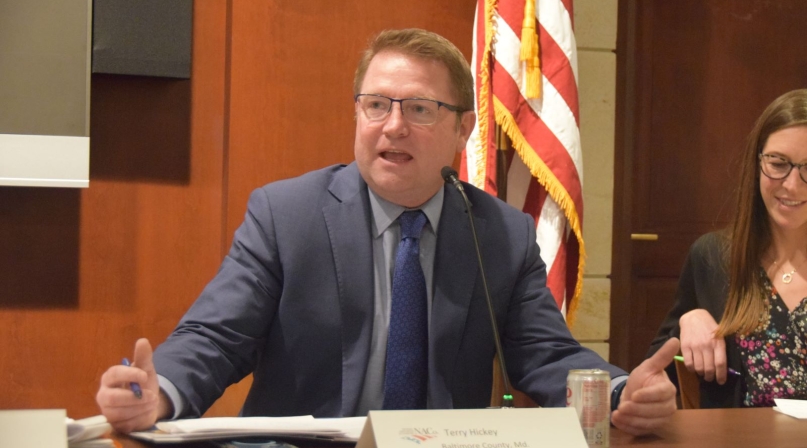Counties brief Capitol Hill staff on housing affordability

Key Takeaways
Members of NACo’s Housing Affordability Task Force offered their experiences and perspectives to congressional staff Nov. 28 at a Capitol Hill briefing.
“Don't forget the centrality of counties, it’s easy to not understand how central county governments are,” Wake County, N.C. Commissioner Matt Calabria cautioned the staff members. He pointed out the wide variety of staffing levels among counties of various sizes, many of which don’t have the capacity to navigate federal bureaucracy — underscoring the federal government’s role as a convener — but emphasized that local processes can help make up for local resource challenges.
Learn more
Housing America's Residents: The Federal-County Intergovernmental Nexus
Housing America's Residents: Finance, Lending and County Tax Policy
“Having everybody in the room is really powerful and it’s very healthy and has a moderating effect and also because people don’t always distinguish between processes and outcomes,” he said about Wake County’s housing inclusive task force. “It’s really healthy to have lots of community stakeholders in the mix when you’re developing whatever affordable housing plans you have.”
When it comes to developing housing, counties can play a number of roles. In addition to engaging their communities, they can also help coordinate a wide swath of county authorities, including zoning, land use and infrastructure policy, finance and more.
Mack Bernard, a Palm Beach County, Fla. commissioner, outlined how his county dedicated $60 million in American Rescue Plan Act funding to meet housing needs, including $10 million each for housing for the homeless and housing rehabilitation.
“We wanted to focus on creating new units,” he said.
Terry Hickey, Baltimore County, Md.’s Housing and Community Development director, praised counties that build housing funds, but also acknowledged that they could potentially do more, financially.
“Putting cash into deals is only going to go so far, and county governments aren’t necessarily good at generating cash and putting them into real estate deals,” he said. “You have to think, ‘What are we good at?’ Baltimore County has a AAA bond rating. If you use a credit enhancement model, we could serve as a lender. That sounds incredibly risky to our budget folks and it’s going to require modeling and really good thought, but we could be a first-place lender, not a gap financer. We know that affordable housing is one of the best and safest investments in real estate.
“We have to start generating financial tools that work with for-profit and market-rate developers who have no interest in going after tax credits. So how can we do direct deals? We need to work upstream with investors, with pension fund trustees. We need to start removing some of the risk and making it easier to do direct investment, build capital stacks of private money that show a real return and then, we need to do things like we talked about.” That might mean waiving local fees to “ make it easier to get through the process,” he noted.
Miami-Dade County, Fla. Commissioner Eileen Higgins lamented that the Bipartisan Infrastructure Law did not include funding for housing but noted that the investments it did make have still helped stimulate housing growth in her county. The bus rapid transit in development in the county’s South Dade corridor will cut commuting time to downtown Miami, and even as the project is more than a year from completion, thousands of new housing units are being built along its path.
“Who’s going to build housing in the private sector and an hour-and-a-half or two hours from jobs?” she asked. “Nobody,” unless the county gives them a reason, like making them convenient to good-paying jobs.
“If I took you on a tour of that, you would see thousands of housing units under construction, most of which are being built by the private sector.”
April Norton, Teton County, Wyo.’s housing director, faces structural and economic challenges in developing housing in the nation’s wealthiest county, which only drives up the cost of housing.
“We have a lack of land that’s appropriate for housing, whether that’s because the land is under conservation easement or it is agricultural use or it’s owned by the federal government or it just lacks infrastructure,” she said. “We have a lack of construction workers. Construction workers can’t afford to live in these places that need housing, so we’re importing them, in addition to importing our nurses and our doctors, our teachers or plow drivers."
Planning for housing means zoning for housing, Norton said, “whether that’s requiring minimum densities or just letting our communities know that we’re going to put affordable workforce housing in this area in your town.”
“Where I live, we have a two-for-one density bonus, so for every extra two feet of market development, you have to provide us with one square foot of workforce housing,” she said. “There’s no income limit on that workforce housing, there’s no rent limit on that workforce housing, there’s no maximum sales price for the workforce housing, we just require that whoever lives in the home, works full time locally. It’s been an excellent tool for us.”
Like any infrastructure project, housing development, particularly when it’s undertaken by the private sector, can be an unwieldy process, so Hickey recommended making that process as easy and inviting for private developers by, as Calabria stressed, having a clear and consistent process.
“You can save a developer hundreds of thousands of dollars and you also have to look at your local density and land use because the amount of units equal money, time is money, certainty is certainly money and so these are things that we can to some degree control at the county level and we have to leverage all of them to get these things done,” he said.
Related News

Counties and Railroads: Shared Priorities for the Next Surface Transportation Bill
County leaders from across the country have a vital opportunity to ensure their infrastructure priorities are front and center.

House reintroduces bipartisan legislation to level playing field for rural communities
House reintroduced the Rural Partnership and Prosperity Act, bipartisan legislation intended to advance economic development in rural counties and overcome barriers to obtaining federal funding and resources.

Podcast: Eastern Tennessee counties invest in tourism during shutdown
Sevier County, Tenn. refused to let the government shutdown devastate its fall tourism draw—Great Smoky Mountains National Park. County Mayor Larry Waters describes the lengths he and his neighbors went to keep the park open. And NACo Chief Government Affairs Officer Mark Ritacco offers an outlook on what counties can take away from the shutdown and into the future.
County News
County News Hot Topics: Housing Affordability

